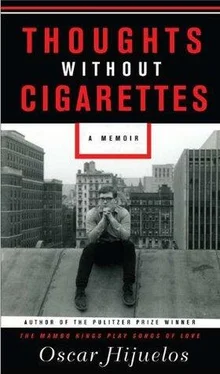
Then, as I remember, I was taken to my room at the end of the hall, and that too seemed vaguely familiar; one of the few souvenirs I’d brought back with me from my trip to my aunt’s — a smallish conga drum with an animal skin head on which was painted the word Cuba —had been set in the corner; a bag of toys accumulated during my stay in the hospital, filled mostly with rubber soldiers that some kindly neighbors had bought for me, my mother placed down on the bed. She pulled up on its sheets, the mattress below—“This one is new!” she insisted — fitted with a plastic cover, as she’d been told by the nurses that I’d started to wet myself at the hospital. Though the steam pipes sizzled, as if frying up things in their paint-mottling juices, my mother, despite that terrible heat, went over to the window and gave it an extra push shut. Then, almost cheerfully, she told me: “ Tienes que descansar ”—“You must rest now.” And while I didn’t feel like napping, and even if it was midafternoon, my mother made me get into bed, explaining that I had been very sick. Naturally, I obeyed. I don’t recall that she kissed me, but, in any event, she turned off the lights and closed the door, leaving me, her most frail and delicate child, to stay awake for hours on end, peering out through the window, which only looked onto a desolate back courtyard anyway, wondering what to make of having to lie there in all that darkness.
CHAPTER 2. A Few Notes on My Past
F or the next two years, I rarely went out, except to St. Luke’s Hospital for checkups and to a few places in the neighborhood, my mother always by my side. She even felt leery about letting me into the hallway to play with the Walker kids, who daily swarmed up and down the stairs and charged along the marble floors. As for the often rowdy children on the street just outside our front windows, the kind of kids who’d shout, “Hey, Johnny, ya can kiss my ass” and “Fuck yourself, man!” as I watched them playing their running and hitting games and sledding down the hill when it had snowed, I felt nothing less than the purest envy for their freedom. Going out my door, onto the sidewalk, seemed a fantasy.
At some point, probably the summer after I’d finally come home, we went down to Coney Island by subway — a long trip in those hot electric-smelling cane-seated cars into Brooklyn, in case you hadn’t the occasion to try that delightful ride out for yourself — on one of the few journeys we made as a family, small as ours happened to be. A photograph: I posed on the boardwalk with my dapper, self-possessed older brother, my father in his looming campesino majesty, and my mother, her usual guarded or skeptical expression on her face. I had on a pair of baggy white shorts and a straw hat, and, unless I’m mistaken, I looked plump and soft, perhaps not at all alert, as if I had no idea what I was doing there, not just at Coney — though I recall enjoying the sweetness of its confection-stand air — but with those people, who happened to be my Cuban family.
In those days, with José in school or else working at some part-time job and doing his thing here and there around the neighborhood, and with my pop often at the hotel, getting in as much overtime as he could manage, my mother became the center of my world, often my only companion — and a rather overly vigilant one at that. She constantly washed my hands (and only with Phisohex, the sole antibacterial soap that doctors considered safe for the infectiously prone) or else told me not to put things I found on the floor in my mouth and kept after my every move; it seems that I became her full-time job. Sweeping the floors or wiping down the walls, swatting at skittering roaches, she was always quejando —mainly about the fact that we were too poor for me to get sick again and about “ los gastos, ” the costs of my medicines and doctors and the hospital visits, some of which my father’s union did not cover, my mother reminding me, “In this country, nobody gives nothing away.” All the while she’d conjure, again and again, those microbes, which seemed to be everywhere, like the very air we breathed, the dust-mote-ridden light through the window, like God.
She’d go on as well about another realm of which I could have only been vaguely aware: her life in Cuba, and the goodness of the people she had known back in Holguín before coming to America—“ Este purgatorio ”—and about how wonderful a man my father had been to her in the days when they met—“ Cuando él me quería, mucho. ” “If only I’d known what I was getting into,” she’d say, without ever missing the chance of attacking Maya. “Borja, yes, she was good to me, she even felt sorry for the way I was treated, but that other one?” She’d shake her head. “That witch. .” And she’d launch into diatribes against my aunt and into the history of their differences, with stories that inevitably began with “One night that woman” or “That one, the evil sister, la mala, thought she could get away with anything, but. .” Byzantine tales of torment and abuse — my fairy tales — flew from her mouth to my ears, and without her once considering just whom she was talking to, or my age and innocence, as if indeed it didn’t matter if I really understood her at all.
Sometimes, she’d take me down the hill along Amsterdam to the ladies’ pelluquería , or hairdressers, on 122nd Street, which my godmother, Carmen, ran with her younger sister, Olga; in that salon, these Cuban beauties and their female clientele formed the hub of local Latina society, just as Freddie’s Bodega and the liquor store next door to it, farther down the block, formed a hub for the Latino men scattered here and there in that ethnically mixed neighborhood. (There was a Japanese restaurant on 119th, a Japanese grocery on 123rd; Irish bars up on Broadway; and, as a matter of course, we’d occasionally see some mysterious-looking Hasidim, with their wild locks of hair, affiliated with the Jewish Theological Seminary, walking on the street. And the center of Harlem itself, on 125th Street, our Times Square, was a tempest of black and Latino and, in those days, Italian folks.) In Carmen’s, I just enjoyed hanging around and overhearing the ladies discuss some rather touchy subjects, like male infidelity, crushes, sex, heartthrobs — the sort of things I assume they assumed I couldn’t understand, even when Carmen tended to speak to her godson, while smiling and pinching my chin, in both English and Spanish. My mother, in such circumstances, tended to tell Carmen not to bother, with the Spanish at least, but she, my godmother, perhaps flabbergasted at the notion, always went on in that way, saying things like “Magda, you have to give him some encouragements. No seas tan dura ”—“Don’t be so hard on him.” She and her sister, Olga, were delicious women, in any case, and quite nice to me. Besides, I just liked the laboratory atmosphere of their salon, with all its space-age-looking hair dryers, ladies in curlers, Spanish in the air, music on the radio, and clients chatting away endlessly in voices that, for the most part, with sunlight pouring down through the window, seemed happy.
And my mother would take me to church occasionally, while my father always stayed home. I enjoyed seeing so many folks dressed up in their Sunday best, the men all wearing hats and ties, and my mother’s friends in their veils and florid hats, smelling nice and looking pretty standing on the steps. While the Mass, in solemn Latin, never failed to put me half to sleep, my mother, nodding at the altar and making the sign of the cross, seemed to take it all to heart, even when she couldn’t always understand the sermons that the Irish priests — Fathers Ford, Dwyer, and Byrne — delivered weekly to a congregation that, bit by bit, was becoming less Irish and more Spanish. We’d sometimes attend High Mass at eleven, to hear my brother, one of the pipsqueaks in the choir, sing, but even then, if a few people started coughing around us, she get me out of there immediately. (And speaking of religion, at home, my mother often punctuated her observations about life with “ Ay, Ave María ” and “ Por Dios! ” for no particular reason at all; I’d sometimes see her sitting by our kitchen table whispering to herself as she read some letters, presumably from Cuba, and then, having prayed, make the sign of the cross. If it was a letter from her mother, María, in Cuba, she’d kiss the wafer-thin paper it had been written on.)
Читать дальше













